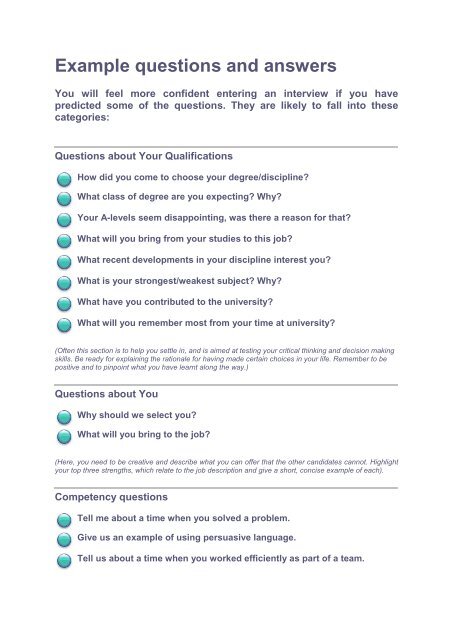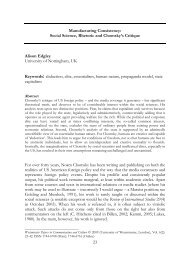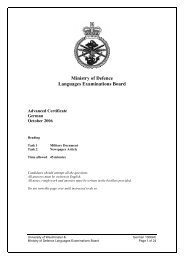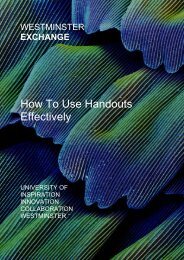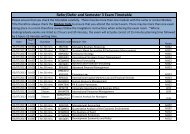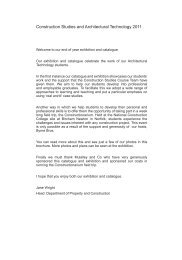Download example interview questions and answers - University of ...
Download example interview questions and answers - University of ...
Download example interview questions and answers - University of ...
Create successful ePaper yourself
Turn your PDF publications into a flip-book with our unique Google optimized e-Paper software.
(Competency <strong>questions</strong> very <strong>of</strong>ten take up the bulk <strong>of</strong> an <strong>interview</strong>. The panel may have a grid with all 6-10competencies required listed (usually found on the job description) <strong>and</strong> are ticking them <strong>of</strong>f as you go. Youtherefore need concrete evidence <strong>of</strong> displaying each.)Personality QuestionsWhat are your strengths/weaknesses?How would your friends/colleagues describe you?How would you describe yourself?What part do you usually play in a team?Can you deal with difficult people? Give me an <strong>example</strong>.What have your read recently that has taken your interest?(Fascinating, as you no doubt are, insights into your personality should be precise <strong>and</strong> relevant to the job.When talking about weaknesses, only mention those that aren't crucial to the role <strong>and</strong> that you are currentlyworking on improving. Offer practical solutions for development. When talking about teamwork, show thatyou know what roles every team needs, then give evidence that you have done them. Straightforward<strong>example</strong>s from customer focused jobs, sport, music <strong>and</strong> community work will demonstrate howcompetently you work with others).Motivation QuestionsWhat do you like doing in your spare time?How do you motivate yourself?How do you deal with pressure/stress?What has your membership <strong>of</strong> 'x' committee/group involved?How have your interests changed since coming to university?What positions <strong>of</strong> responsibility do you hold/have held?What has been your greatest achievement?(Employers are so keen on interests because they reveal what motivates you, what you value <strong>and</strong> how youorganise your time. Many organisations have core values <strong>of</strong> their own so try <strong>and</strong> blend yours into theirs. It'salways best to highlight activities you've enjoyed in teams/groups as they demonstrate potential leadershipqualities).Employer QuestionsWhy did you apply to us?
Why do you want to work for this company?How much do you know about our organisation?What do you see as the main problems <strong>and</strong> opportunities facing ourorganisation/industry/sector at this time?(Demonstrate that you have been reading relevant company literature e.g. case studies, annual report,website <strong>and</strong> prove this by dropping in some key facts <strong>and</strong> figures about the organisation's strengths. Matchyour skills <strong>and</strong> interests to what they do best).Career QuestionsWhat attracted you to this industry/sector?Where do you see yourself in 5/10 years time?What do you look for in a job?Tell me about your career aspirations.Describe your ideal employer/manager.Why are you interested in management?Tell me about a time when you took on a leadership role.What have you learnt from your work experience?(Although needing to be sensible <strong>and</strong> realistic, your <strong>answers</strong> should show some ambition in the context <strong>of</strong>the job <strong>and</strong> the company. Employers want to see some long term dividend if they are to invest in you <strong>and</strong>in your training. Be positive <strong>and</strong> ensure that you take this opportunity to emphasise how well you match theneeds <strong>of</strong> your potential employer within this career. Your description <strong>of</strong> an ideal manager gives theemployer some clues about what kind <strong>of</strong> manager you'd make).Unexpected Questions...What will you do if you're not <strong>of</strong>fered the job?(Show confidence in your ability to cope with failure <strong>and</strong> what practical steps you would take. Don't beafraid to name any <strong>of</strong> the key competitors: this demonstrates commercial awareness which employers arevery keen on).What has been your biggest failure?(Life is one big learning cycle: focus on what you would do differently next time).If you were a cake, what kind <strong>of</strong> cake would you be?
(Have you got a sense <strong>of</strong> humour? If so, here's your chance to show just how good-natured <strong>and</strong> unruffledyou are in dealing with daft <strong>questions</strong>!)Personal QuestionsA well-trained <strong>interview</strong>er should not ask you any <strong>questions</strong> which bear no relevance to the job. If youconsider a question inappropriate, be polite but, if necessary, be firm in your refusal to answer.'Have you got any <strong>questions</strong> for us?'The answer, clearly, is 'YES'. But if all your <strong>questions</strong> have genuinely been covered, then say so, politely.Don't just sit there looking blank <strong>and</strong> uninterested.When thinking <strong>of</strong> <strong>questions</strong>, consider the following:Show further interest in the organisation e.g. the working culture, socialactivities, charity or community work, work-life balance, the diversity <strong>of</strong>the workforce, products available, sector trends, future strategies.Show an interest in your training e.g. appraisal procedures, mentoring,courses, potential for moving around the organisation.If you're unclear about the next stage, ask: When can I expect to hearfrom you? What happens next?Don't ask about company cars, pensions or million pound bonuses. It'snot appropriate at this stage.Salary negotiations usually take place once a job is <strong>of</strong>fered or may bediscussed in the <strong>interview</strong> itself: wait for the right time.


